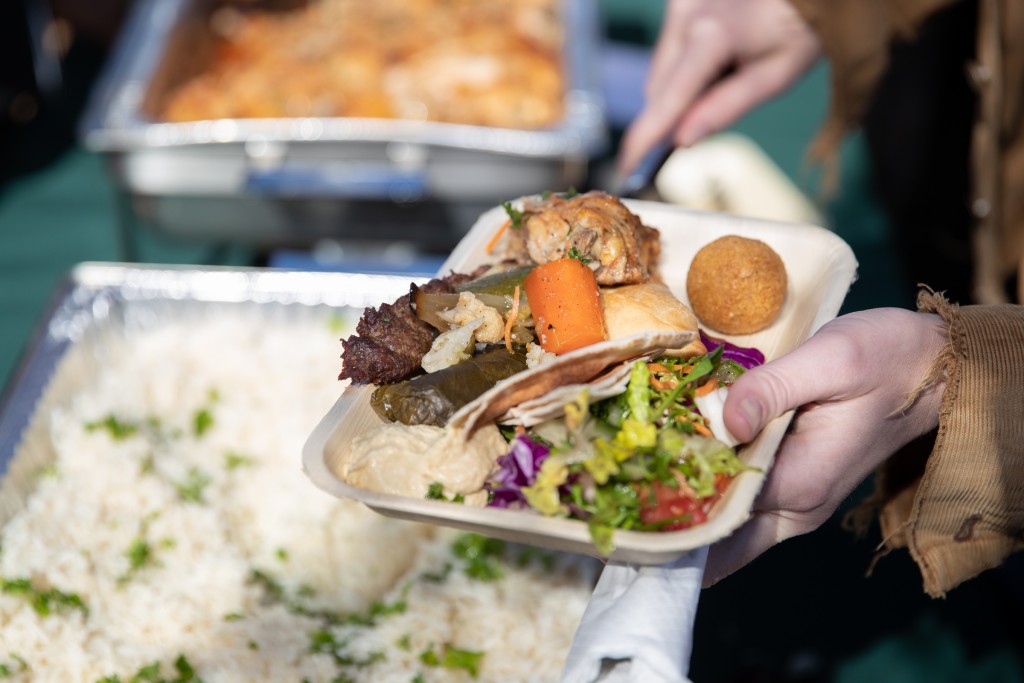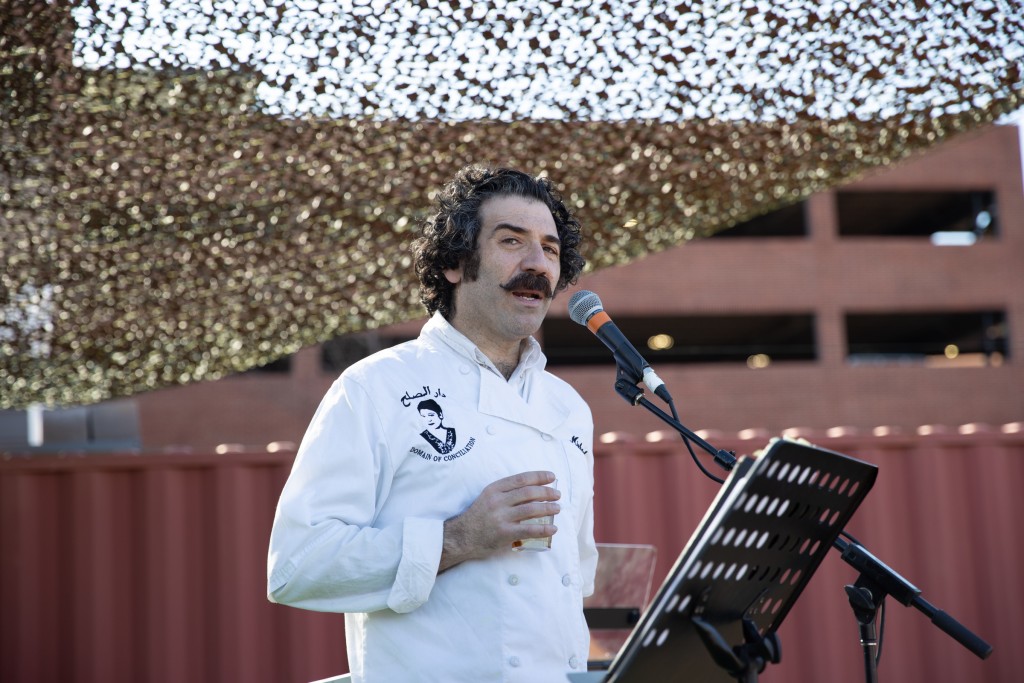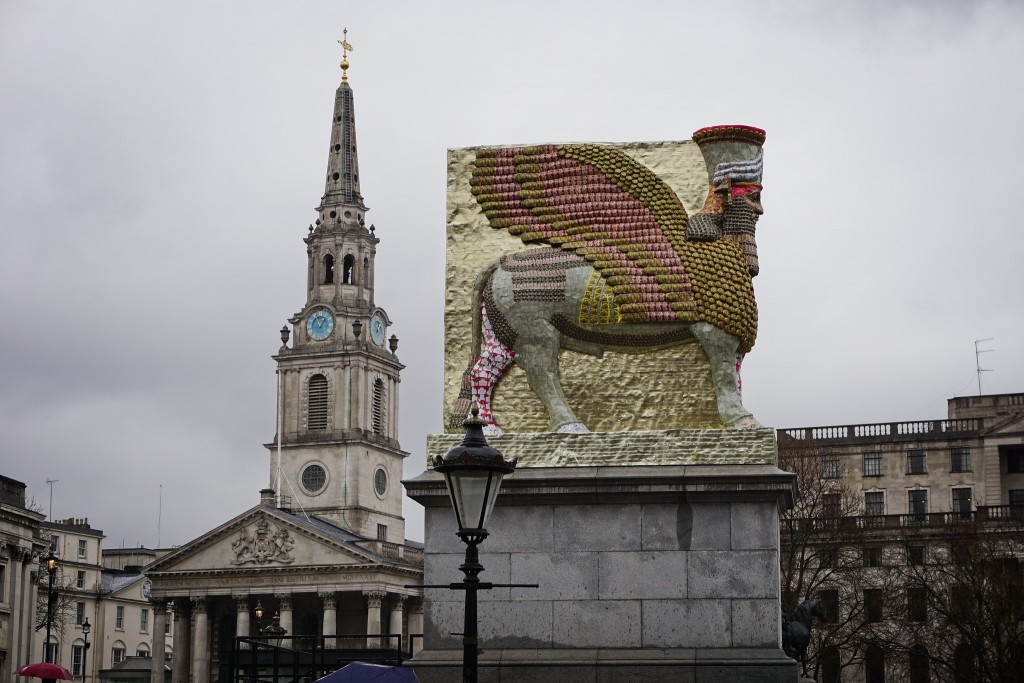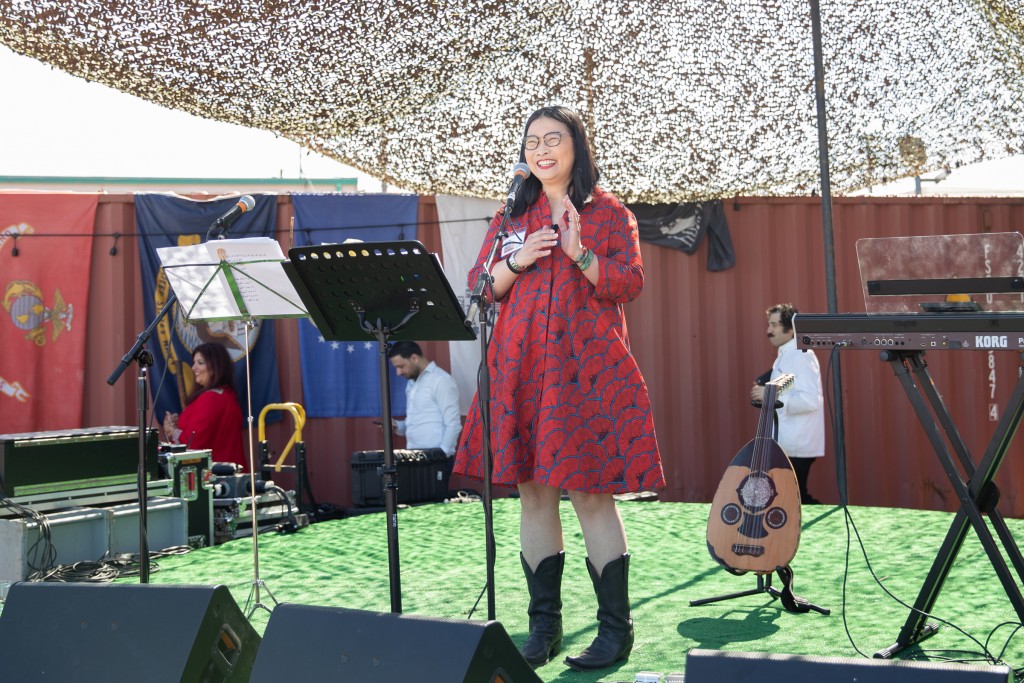Restoring Lost Iraqi Culture One Can of Date Syrup At A Time
ArtandSeek.net February 13, 2020 12Since 2007, artist Michael Rakowitz has been creating replicas of Iraqi cultural artifacts destroyed or lost in war.
But the Chicago-based artist doesn’t use stone. Instead, he crafts his works from Iraqi food packaging.
His work has earned him the 2020 Nasher Prize in sculpture, and the Nasher Sculpture Center kicked off their month-long celebration of Rakowitz with a special community BBQ.

The menu at the Nasher’s community BBQ included Syrian grilled chicken, Damascus kabab, hummus and fattoush salad. Photo: Courtesy of Nasher Sculpture Center
It wasn’t brisket and ribs on the menu, but Syrian grilled chicken, fattoush salad and a smorgasbord of Middle Eastern dishes.
Dressed in a white chef’s jacket, Michael Rakowitz was in his element. He was helping serve hungry crowds by drizzling fresh fruit with tahini and Iraqi date syrup.

2020 Nasher Prize laureate Michael Rakowitz spoke to the crowd at the Nasher’s community BBQ on Saturday, February 8, 2020. Photo: Courtesy of Nasher Sculpture Center
“The date syrup is actually processed in the Iraqi capital,” Rakowitz said. “It’s put into large plastic vats, then driven over the border into Syria, where it’s put into unmarked tin plate steel cans, then driven over the border into Lebanon, where it gets labeled and is sold to the rest of the world.”
The Iraqi-Jewish artist says disguising the syrup as a Lebanese product gives it a chance of getting out into the world.
“I started to build my entire practice around this can of date syrup,” Rakowitz said. “It was almost as if the pressures of xenophobia had been exerted onto this object that was so terrified that it couldn’t tell me where it was from.”
Those cans became the building blocks for Rakowitz’s work.
“I’m making those objects out of traces of the visibility of Arabic culture throughout the United States,” Rakowitz said. “The packaging of Middle Eastern foodstuffs and Arabic-English newspapers.”
His most well-known piece is a re-creation of the Lamassu.

Michael Rakowitz’s Lamassu will sit on the Fourth Plinth in Trafalgar Square in London until it is replaced in 2020. Photo: Courtesy of Garry Knight/Flickr
These winged stone deities, thousands of years old, guarded the ancient Assyrian city of Niniveh until 2015, when the statues were destroyed by ISIS.
Rakowitz’s Lamassu, built from bright green and yellow date cans, currently sits on the Fourth Plinth in Trafalgar Square in London.
It’s just one on a long list of works he hopes to replicate.
“In the 14 years since I started that project, my studio and I have made about 900 of those artifacts,” Rakowitz said. “So, it is a work that will outlive me and my studio.”
The art world has praised Rakowitz for his politically-charged work. In April, the Nasher Sculpture Center will present him with their annual prize.
At $100-thousand dollars, it’s the largest prize in the sculpture world. But, Rakowitz is more than a sculptor. He also deals in the exchange of culture through food.
It’s an ethos he shares with the women of Break Bread Break Borders, the Dallas nonprofit catering company behind the feast.
The company employs refugees of war, providing an economic opportunity for the women and an educational one for the public.
Founder Jin-Ya Huang says her mother inspired her to start the company two years ago.

Jin-Ya Huang, founder of Break Bread Bread Borders, spoke to the crowd at the Nasher’s community BBQ on Saturday, February 8, 2020. Photo: Courtesy of Nasher Sculpture Center
“I chose to create Break Bread Break Borders as a community dinner to connect people through food because it’s such a wonderful equalizer,” Huang said. “For my mom, it was such an amazing universal language.”
A language Rakowitz has used in past projects, like in a 2017 installation called “Enemy Kitchen.”
Rakowitz took to the streets of Chicago to serve his own mother’s Iraqi recipes. He recruited combat veterans to cook in a food truck alongside Iraqi chefs.
“They’re working with the spices that they would smell in the market but were never allowed to eat on their own,” Rakowitz said. “It’s something that they’re learning, and what some of the work has done is ask for those veterans not to speak about how the war changed them but, rather, how Iraq changed them.”
The through line in his work — from sculptures to food trucks — is an attempt to combat what Rakowitz calls cultural amnesia.
“How do we do things like humanize Iraq and Iraqis, and pull it out of the frame of war?” Rakowitz said. “Out of the frame of conflict and do something to restore some dignity to it?”
Sharing a plate of fresh fruit drizzled in Iraqi date syrup is a good place to start.









